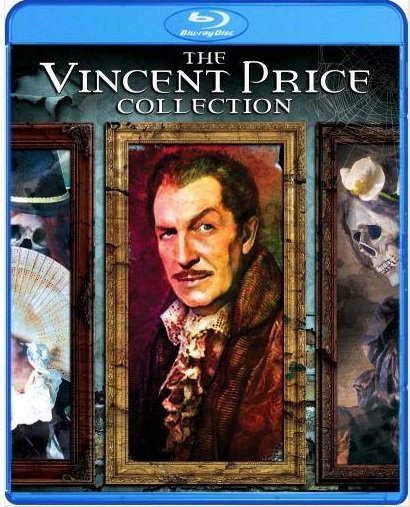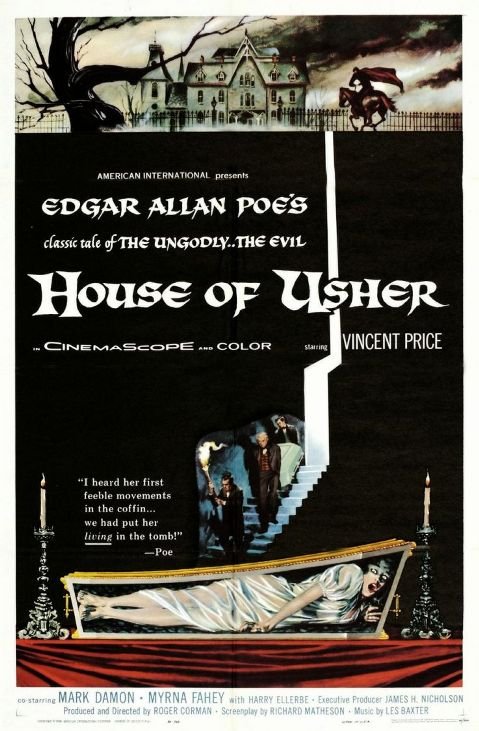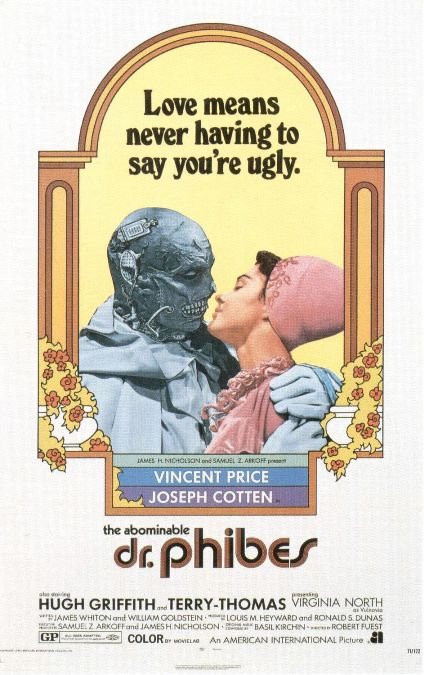Digi-Schlock: THE VINCENT PRICE COLLECTION (Scream Factory Blu-Ray Box Set)
For their early releases, Scream Factory devoted their release schedule to genre fan favorites from the '70s and '80s. However, the ever-growing lineup of major label catalogs now gives them the option to go deeper into vintage territory - and they've produced one of their most impressive releases to date with The Vincent Price Collection. The result offers up-to-date transfers of these catalog gems plus a wealth of extras both new and old that give the viewer a crash course in the importance of Price to the horror genre.
 This set collects six Price vehicles from the '60s and early '70s on four blu-ray discs: The Pit & The Pendulum, Masque Of The Red Death, The Haunted Palace, House Of Usher, The Witchfinder General and The Abominable Dr. Phibes. Witchfinder and Phibes get their own stand-alone discs while the other films are paired up two to a disc. HD transfer quality looks good on all films: the older titles show their age via some minor bits of age-related speckling but everything is pretty robust in terms of color and they all have a pleasing level of detail. Masque and Phibes look particularly good here. Lossless mono audio is included for each film and the vintage mixes sound nice, with no distortion or other flaws to speak of.
This set collects six Price vehicles from the '60s and early '70s on four blu-ray discs: The Pit & The Pendulum, Masque Of The Red Death, The Haunted Palace, House Of Usher, The Witchfinder General and The Abominable Dr. Phibes. Witchfinder and Phibes get their own stand-alone discs while the other films are paired up two to a disc. HD transfer quality looks good on all films: the older titles show their age via some minor bits of age-related speckling but everything is pretty robust in terms of color and they all have a pleasing level of detail. Masque and Phibes look particularly good here. Lossless mono audio is included for each film and the vintage mixes sound nice, with no distortion or other flaws to speak of.
The producers of this set have also packaged each disc to the rafters with extras. On the simplest level, there is at least one theatrical trailer for each film and an image gallery that includes stills, publicity photos and ad mats. It's worth noting that The Witchfinder General includes the American trailer for the film under its retitling, The Conqueror Worm, and it's interesting to see how it attempts to pitch this film to viewers as an Edgar Allan Poe adaptation.
In a truly unique touch, each film also includes a video introduction and outro by Price, with all these pieces drawn from a retrospective done by an Iowa PBS station in 1982. The star is in fine fettle here, offering factoids and opinions laced with a few darkly humorous comments. The disc for The Abominable Dr. Phibes also includes a new featurette about these wrap-around segments entitled "Introductory Price." They're built around an interview with Duane Huey, who Price's dialogue for the series. He reveals how Price came to work with PBS, how the dialogue for the wrap-arounds was all drawn from Price's interviews and, most impressively, how Price shot all the segments for this series in one long day! Also included are some fun outtakes from the shoot with Price good-naturedly joking around with the crew.
For ease of reference, the remainder of the extras will be discussed on a film-by-film basis...
 This film features a commentary with producer/director Roger Corman that was carried over from the old MGM disc of this title. It's an engaging, informative chat in which Corman discusses how this film found him building both literally and figuratively on House Of Usher. He talks about the challenges of having to invent a first and second act to go with the third act provided by the original Poe story, how the sets literally expanded on those already built for House Of Usher and how Freudian theory influenced his direction.
This film features a commentary with producer/director Roger Corman that was carried over from the old MGM disc of this title. It's an engaging, informative chat in which Corman discusses how this film found him building both literally and figuratively on House Of Usher. He talks about the challenges of having to invent a first and second act to go with the third act provided by the original Poe story, how the sets literally expanded on those already built for House Of Usher and how Freudian theory influenced his direction.
This disc also includes a rare prologue for the film that was shot especially for t.v. broadcasts: it's a pretty nerve-rattling sequence with Luana Anders being accosted by patients in an asylum.
 This film is treated to a new commentary by genre historian Steve Haberman. His track offers both a history of the film and a critical analysis of its elements and layers. Along the way, he discusses the history of the Poe short story that inspired the film, the complex process of its adaptation for the screen and how financial considerations led to it being shot in the U.K. He also discusses the various cast members, including a nice thumbnail history of Price's career and even offers an account of Corman's now-famous lunch with Paul McCartney during the film's shoot.
This film is treated to a new commentary by genre historian Steve Haberman. His track offers both a history of the film and a critical analysis of its elements and layers. Along the way, he discusses the history of the Poe short story that inspired the film, the complex process of its adaptation for the screen and how financial considerations led to it being shot in the U.K. He also discusses the various cast members, including a nice thumbnail history of Price's career and even offers an account of Corman's now-famous lunch with Paul McCartney during the film's shoot.
An interview with Corman is carried over from the old MGM DVD of this film. It's an informative 20-minute chat in which Corman reveals why he delayed making this film for so long in the Poe cycle, the various arthouse influences he brought to his direction and his own account of his meal with McCartney.
 This film gets two short-form commentary tracks. The first is by Price historian Lucy Chase Williams and Richard Heft. It plays like an audio essay and is packed with tons of historical detail. Williams' portion of the track runs 30 minutes and covers the history of screenwriter Charles Beaumont and the cast as well as some info on Poe films that Corman never got to make. Heft offers an additional 10 minutes on this track that focus on the script. He discusses the history of the Lovecraft story that inspired the film plus how Beaumont drew from his own t.v. pseudo-adaptation of the tale and other stories by the author.
This film gets two short-form commentary tracks. The first is by Price historian Lucy Chase Williams and Richard Heft. It plays like an audio essay and is packed with tons of historical detail. Williams' portion of the track runs 30 minutes and covers the history of screenwriter Charles Beaumont and the cast as well as some info on Poe films that Corman never got to make. Heft offers an additional 10 minutes on this track that focus on the script. He discusses the history of the Lovecraft story that inspired the film plus how Beaumont drew from his own t.v. pseudo-adaptation of the tale and other stories by the author.
The second track is a 30 minute piece by genre historian Tom Weaver. He offers a more in-depth treatment of the material that Heft touched upon, comparing the film's script with readings of material from Beaumont's One Step Beyond script that borrowed from the Lovecraft short story. He also includes a phone interview with Debra Paget in which she talks about Price and Corman, including a great anecdote with the director getting frustrated on the set. It even includes a little radio play version of some material from the script that includes Paget and Corman himself!
Also included is an interview featurette with Corman from the original MGM DVD. It is entitled "A Change Of Poe" and finds the director talking about how he chose to adapt Lovecraft as a sort of palate cleanser in the midst of making several Poe films and the stylistic choices he made to differentiate this movie from his Poe adaptations.
 This film features two commentary tracks, one old and one new. The first is a full-length track with Corman. It's an excellent nuts-and-bolts track with a heavy focus on directorial technique, including tips on how to compose impressive shots and how to use camera movement to make dialogue scenes interesting. He also speaks in detail about the joys of working with Price and screenwriter Richard Matheson, plus some material on what it was like working for A.I.P.
This film features two commentary tracks, one old and one new. The first is a full-length track with Corman. It's an excellent nuts-and-bolts track with a heavy focus on directorial technique, including tips on how to compose impressive shots and how to use camera movement to make dialogue scenes interesting. He also speaks in detail about the joys of working with Price and screenwriter Richard Matheson, plus some material on what it was like working for A.I.P.
The second track features Lucy Chase Williams and runs about 30 minutes. It's essentially a biographical piece on Price that makes a case for him as an influence on pop culture, delving into his culinary skills and his side-career as an art expert/commentator. This essay also mixes in some quotes from Price, who is effectively imitated by Piotr Michael.
On a similar historical note, fans are also treated to a 41-minute interview with Price, conducted by David Del Valle. It has a heavy focus on the early part of his career, with much talk of his work on the Broadway stage and his early films.
 This film features two new commentary tracks. The first pairs director Robert Fuest with genre historian and author Marcus Hearn. Hearn is well-informed and plays a major role in prompting Fuest with various factoids and questions. Fuest reveals how he rewrote the script for production, including an ending penned by his Avengers co-hort Brian Clemens, and his surprisingly naturalistic approach to directing such outré material. He also discusses the 2nd Phibes film and an unmade third film.
This film features two new commentary tracks. The first pairs director Robert Fuest with genre historian and author Marcus Hearn. Hearn is well-informed and plays a major role in prompting Fuest with various factoids and questions. Fuest reveals how he rewrote the script for production, including an ending penned by his Avengers co-hort Brian Clemens, and his surprisingly naturalistic approach to directing such outré material. He also discusses the 2nd Phibes film and an unmade third film.
The second track features Justin Humphreys, another genre historian who is at work on a history of the Phibes films. His track is both an appreciation and a history of the film. Topics he covers include how the film sets many horror tropes on their ears, how Fuest's t.v. background allowed him to direct with a sense of narrative economy and an analysis of how the art-deco movement influenced the film's production design. He tends to gush about the film in spots, a habit he freely admits, but his enthusiasm and knack for picking out unique details in the film keep it compelling.
 A pretty impressive pile of extras for this title begins with a commentary track featuring actor Ian Ogilvy, producer Philip Waddilove and commentator Steve Haberman. This track was carried over from the MGM special edition DVD of this title and is an informative affair. Ogilvy offers a number of tales from the actor's perspective, including a tale of how he broke his foot during a fight scene, as well as memories of his friendship with Reeves. Waddilove has plenty of production and location tales, including a great anecdote of trying to get a reluctant Price to see a doctor after he fell off his horse. Haberman keeps them prompted with interesting questions and offers some analytical bits, including an interesting theory about how Hopkins represents the corrupting influence of evil.
A pretty impressive pile of extras for this title begins with a commentary track featuring actor Ian Ogilvy, producer Philip Waddilove and commentator Steve Haberman. This track was carried over from the MGM special edition DVD of this title and is an informative affair. Ogilvy offers a number of tales from the actor's perspective, including a tale of how he broke his foot during a fight scene, as well as memories of his friendship with Reeves. Waddilove has plenty of production and location tales, including a great anecdote of trying to get a reluctant Price to see a doctor after he fell off his horse. Haberman keeps them prompted with interesting questions and offers some analytical bits, including an interesting theory about how Hopkins represents the corrupting influence of evil.
There is also a 25 minute making-of piece about the film that includes commentary from U.K. critics like Stephen Jones and Kim Newman. It offers an informative history of Reeves' too-short career and discusses how Price being forced on the film by producers led to a contentious relationship between Price and Reeves (and ultimately a great performance).
 Elsewhere, there are two long-form interviews included on this disc. The first is 40-plus minute chat with Price's daughter, Victoria. She's able to reveal a lot of interesting material about the man behind the persona, including how Price's passion for art was a driving force, his stern but loving parental style and, most interestingly, his mentor-style friendship with Dennis Hopper.
Elsewhere, there are two long-form interviews included on this disc. The first is 40-plus minute chat with Price's daughter, Victoria. She's able to reveal a lot of interesting material about the man behind the persona, including how Price's passion for art was a driving force, his stern but loving parental style and, most interestingly, his mentor-style friendship with Dennis Hopper.
There is also a 1988 interview of Vincent Price by David Del Valle. This piece has appeared on DVD before under the title "The Sinister Image" is well worth the time for the star's fans. All of the films included in this collection are discussed in this chat, along with every major highlight of Price's career. You'll hear fun anecdotes about Roger Corman, William Castle, The Fly and countless other topics. Del Valle loves old Hollywood as much as he does horror so you'll hear a lot about Price's non-horror work like Laura and The Ten Commandments, too.
Finally, there is one last bonus tucked away in the case itself, a 22-page booklet. It contains 11 pages' worth of liner notes b y Del Valle, who reflects on his friendship with Price and quotes the star extensively about his thoughts on the films contained in this set (amongst other topics). It adds a nice personal touch - and the value of the booklet is further enhanced by an array of full-color reproductions of posters and stills for the films in this set.
y Del Valle, who reflects on his friendship with Price and quotes the star extensively about his thoughts on the films contained in this set (amongst other topics). It adds a nice personal touch - and the value of the booklet is further enhanced by an array of full-color reproductions of posters and stills for the films in this set.
All in all, The Vincent Price Collection is a real achievement for Scream Factory. It's got a great selection of films presented properly and the producers truly went the extra mile in assembling extras for this set. There are plenty of other worthy Price vehicle in the MGM catalog - Theater Of Blood, Dr. Phibes Rises Again and The Raven, to name just three - so fans should invest in this set to make sure these films continue to get this kind of red-carpet treatment.
To read Schlockmania's film review of House Of Usher, click here.
To read Schlockmania's film review of The Pit & The Pendulum, click here.
To read Schlockmania's film review of The Haunted Palace, click here.
To read Schlockmania's film review of Masque Of The Red Death, click here.
To read Schlockmania's film review of The Witchfinder General, click here.
To read Schlockmania's film review of The Abominable Dr. Phibes, click here.


